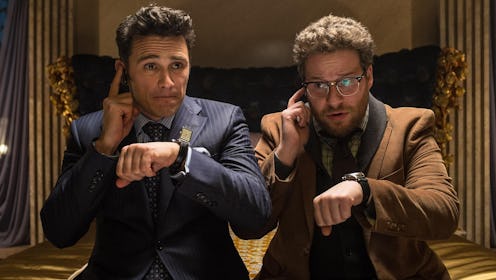Entertainment
What the Decision to Pull 'The Interview' Means

A year ago, anyone brazen enough to accuse James Franco of sociopolitical prominence would have been tarred, featured, and run out of town. But with Sony Pictures’ decision to pull The Interview , his new comedy with Seth Rogen, from theaters prior to release, as well as to eschew any alternative viewing options like VOD, the Freaks and Geeks veterans have cemented stature as two of the most important figures in modern cinema.
Although The Interview is hardly the first movie to be canceled or otherwise banned, the circumstances surrounding its abandonment are truly unique — and the controversy unparalleled. On one side of the discussion, we have many sympathizing with the decision of the distribution company and, as revealed prior to its dismissal altogether, several large theatrical chains under the “better safe than sorry” mentality. The far more vociferous opposition, however, castigates the appeasement of the lampooned subject North Korea and the hacker group the Guardians of Peace as kowtowing to tyrants and terrorists. And all this from a movie whose select few viewers call it more a silly farce than anything else.
Of course, satirical comedy has lived snugly in the grand tradition of public and legislative backlash, both domestically — as in the case of Life of Brian , the Monty Python picture that was banned in theaters throughout America due to an irreverent illustration of the story of Jesus Christ — and overseas — a great array of United States laughers, notably the films of Sacha Baron Cohen, have been deemed unfit for viewing in Eastern European and Central Asian countries.
America has seen a fair share of dramatic pictures blocked and censored as well. Last Tango in Paris was the subject of the Supreme Court’s vigilant ire; The Last Temptation of Christ was pushed back from and nearly lost out on release altogether in certain parts of the country.
But standing alone among the lot in so many ways is The Interview — a universally banned movie, and one whose decree came from its home studio itself.
This isn’t like The Last Temptation of Christ, which was pulled from certain theaters under the jurisdiction of some Christians holding strong to the legislative strings attached to towns in Georgia. Nor is it at all similar to the many foreign films to stir bile in their own countries resultant of tones and themes standing combative to the tyrannical regimes at hand — earlier this year, filmmaker Jafar Panahi created the movie Closed Curtain, a psychologically dense, fourth-wall-breaking drama with a lot to say about the Iranian government and it has barely earned distribution (despite being an excellent piece of work). Former political prisoner Panahi is responsible for the likewise banned documentary This Is Not a Film .
A distinct case from all those mentioned, The Interview is the closest scenario to a case of true, ultimate censorship on American soil — though not quite. Prior to the National Association of Theater Owners’ endorsement of the aforesaid theatrical chains’ decisions to yank The Interview from their auditoriums, President Barack Obama represented the U.S. government in supporting the release of the film. This effort alone should keep us from assigning any proclamations of a violated First Amendment.
But it’s still something to worry about. Across the globe, censorship is a key component in the maintenance of tyranny and oppression. The principal values on which America prides itself are the freedom of speech, press, religion, and art — something we felt tugged away when the film was deemed “not allowed” for public viewing.
Is the decision an understandable one? Anyone with a hint of reason and empathy would agree. Is the decision the right one? Most in the same community would assert not. Is it an isolated incident? We can only hope.
Images: Columbia Pictures (3)